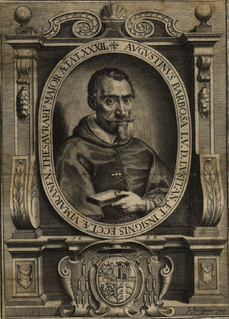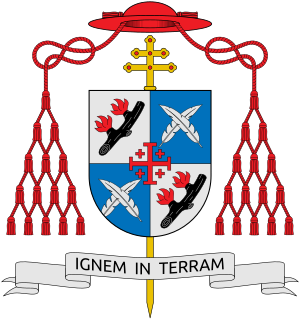Francesco Antonio Zaccaria was an Italian theologian, historian, and prolific writer.
Sacramentum Poenitentiae was an apostolic constitution promulgated by Pope Benedict XIV in 1741, discussing the offense of solicitation, which is the crime of making use of the Sacrament of Penance, directly or indirectly, for the purpose of soliciting sexual activity.
Paul Laymann was an Austrian Jesuit and important moralist.
Regulæ Juris, also spelled Regulae iuris were legal maxims which served as jurisprudence in Roman law.
Giovanni Paolo Lancelotti was an Italian canonist.
Prospero Fagnani was an Italian canon lawyer. Some writers place his birth in 1598, others in 1587 or in 1588.
Vitus Pichler was an Austrian Jesuit canonist and controversial writer.
Francis Xavier Schmalzgrueber was a German Jesuit canonist.
Georg Graf was a German Orientalist. One of the most important scholars of Christian-Arabic literature, his 5-volume Geschichte der christlichen arabischen Literatur is the foundational text in the field.
Anthony Konings was a Redemptorist professor, who wrote works of theology which influenced Catholic life in late nineteenth century America.

Agostinho Barbosa was a prolific Portuguese writer on canon law. His work included dictionary-type surveys of the legal elements.
Zeger Bernhard van Espen (Espenius) was a Belgian canonist, who supported Gallican theories and was an ardent upholder of secular power against religious authority. Van Espen is generally classed among the ablest writers on ecclesiastical law
A college, in the canon law of the Roman Catholic Church, is a collection of persons united together for a common object so as to form one body. The members are consequently said to be incorporated, or to form a corporation.
Carlo Sebastiano Berardi was an Italian Roman Catholic priest and canon lawyer.
Placidus Böcken was a German Benedictine canon lawyer, and Vice-Chancellor of the University of Salzburg.
Pedro Lombardía was a Spanish canonist and pioneer of the Study of State Ecclesiastical Law in Spain. He held the chairs of Canon Law and State Ecclesiastical Law at the University of Navarra and the Complutense University of Madrid.

Walter Brandmüller is a German prelate of the Catholic Church, a cardinal since 2010. He was president of the Pontifical Committee for Historical Sciences from 1998 to 2009.

Hartmann von Dillingen was Bishop of Augsburg from 1248 until his death.
Jus antiquum is a period in the legal history of the Catholic Church, spanning from the beginning of the church to the Decretum of Gratian, i.e. from A.D. 33 to around 1150. In the first 10 centuries of the church, there was a great proliferation of canonical collections, mostly assembled by private individuals and not by church authority as such.
The jurisprudence of Catholic canon law is the complex of legal theory, traditions, and interpretative principles of Catholic canon law. In the Latin Church, the jurisprudence of canon law was founded by Gratian in the 1140s with his Decretum. In the Oriental canon law of the Eastern Catholic Churches, Photios holds a place similar to that of Gratian for the West.


